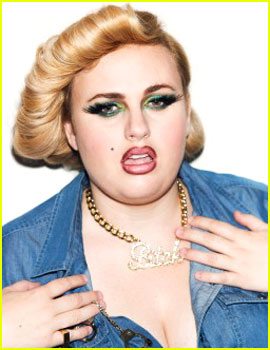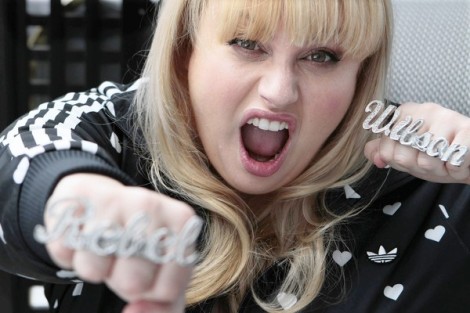Elle Says:
Ah, the classic turf war, Romeo and Juliet style. Except with the humor spin. Bring It On meets Step Up meets Twilight. (Sorry, Anna Kendrick, but that’s where everyone first noticed you, in the “classic” turf war over the supernatural superiority of a vampire/werewolf, over the hotly disputed, high-profile land of Forks, WA, over the brilliance and vivacity of Bella/Kristen Stewart (everyone reads that sarcasm, right? Just wanted to be sure)).
I’m talking about Pitch Perfect, the new movie musical comedy about college a capella turf wars, which opens nationwide today. It stars Anna Kendrick and features the lovely – and hilarious – Rebel Wilson. I’ve only seen the trailer, but what I’ve seen is a depiction of a plus size woman as the funny fat girl. And aren’t we tired of that already? Let’s delve in.
The Plastic: “What’s your name?”
Amy: “Fat Amy.”
Plastic: “You call yourself Fat Amy?” (As in, how could you ever stoop to that level?)
Amy: “Yeah, so twig bitches like you don’t do it behind my back.”
No doubt about it, this is a strong, brassy character. She’s not oblivious to other people’s taunts or judgments. By first acknowledging them and self-identifying – by name – as “fat,” she underscores her size and also undermines it. The idea here is that naming the “problem” or circumstance relinquishes its power as a force of hate. What social rank the “skinny bitches” had based on looks is no longer unspoken; the speech act by the person most affected – the “fat” girl – inverts (or at least balances) social power, for she calls attention to the unspoken prejudice, to its moral ineptitude, and in the process transfers the moral authority (and correctness) to herself.
That is to say, she owns it. Fat Amy embraces her size. By identifying herself as “Fat Amy,” the idea is that the character can just be “Amy,” who only happens to be fat.
That’s the idea. However, in acknowledging her size, Amy (and, perhaps more importantly, Australian actress Rebel Wilson, who portrays her) is simply playing the part of big, bawdy comedienne, which I have elsewhere argued is one of the few, stereotypical roles allotted to plus-size women (see McCarthyism).
As in Bridesmaids, Rebel Wilson seems to be playing a character defined by her size. Her minor role as the crazy roommate with the uncomfortably close relationship to her brother and a penchant for large, ugly, unsanitary tattoos (and showing them off on her larger body canvas) does seem to get an upgrade in Pitch Perfect. In fact, the screen time Rebel Wilson gets in the preview certainly rivals (or maybe even beats?) Anna Kendrick’s, even though Kendrick is clearly the lead. But Kendrick represents the talent, the revolutionary a capella leader (yes, even I realize how hokey that sounds – and I love vocal performance); Fat Amy represents the comedy. Obviously Rebel Wilson also has talent – and a great amount of it – both as an actress and as a singer; Fat Amy must have the same vocal talent. But her size categorizes her more in the role of comedy, not drama or rebel talent.
But back up. Rebel Wilson deserves congratulations for her emergence in Hollywood, for landing more substantial (meaning more screen time) roles and being recognized. A huge part of that recognition is her prowess as a comedienne. She’s funny. Case in point:
“Skinny bitch” leader talking about fundraising: “A bikini car wash is definitely out of the question.”
Fat Amy: “No, Aubrey, I’m like super good at bikini car washes.”
She makes a squeaking noise as she moves her chest in a circular motion, simulating using her breasts to clean the hood of a car. In this moment, Wilson uses her comedic skills to accommodate her body for humor. Actors should use what they have (their bodies, their experiences) to create character, should embrace who they are and incorporate that into their performances. But the body is only one part; it shouldn’t be the whole act. Right after this moment, there’s some redemption in the trailer as we see a brief shot of Amy in the pool, surrounded by shirtless hunks, in a bathing suit – owning it.
Moment of redemption aside, the trailer (and the movie, by extension) and the character of Fat Amy still rely on Wilson’s body for her humor. In “the Riff” throwdown (I’m assuming the girls’ use of “ethnicity” (please read that with a grain of sarcastic salt) in their song choice makes them the Sharks instead of the Jets?) when they bust out “No Diggity,” at the lyric “Got game by the pound,” Amy slaps her stomach, once again calling attention to her size in a way that’s meant to “own it” but is completely unnecessary and only solidifies her identity as “The Big Girl” in the group dynamic.
At the end of the trailer, it seems that Amy is given a romantic opportunity, though I can’t be sure of the context. She dismisses the half-assed advance in a show of confidence and wisdom, as though being the fat girl isn’t going to suggest that she has so little self-esteem that she’ll fall for whatever guy comes her way. But the way the bit is set up, my guess is that her rejection is meant not to praise Amy’s romantic insight but to more fully diss the guy. “You’re so despicable that even the fat girl rejected you.” (Of course, this might be an unfair evaluation involving too much of my own personal experience reading into the scene. Nevertheless, I think this is a fair option for interpretation.)
The trailer’s most despicable “scene” is the brief bit about exercise. We see the girls in workout clothes, and their leader tells them to commit to a cardio routine. Amy raises her hand, “No, don’t put me down for cardio.” The next shot, we see the girls running the stairs, while Amy lies in the bleachers, legs idly pedalling in the air, performing “horizontal running.”
Unlike the other moments I’ve mentioned, Amy’s humor here has no reference to “owning it.” This is pure exploitation of the stereotype or the assumption that overweight people don’t exercise. Or, perhaps, it suggests that they can’t and won’t.
I am overweight. Obese even, technically speaking. (And that’s hard to admit.) And I’m working on it, but there are more psychological and behavorial issues at stake that just hitting the gym aren’t necessarily going to fix. I have been overweight almost all of my life, and most of my life, I have been engaged in some kind of physical activity. In middle school and high school, I was a cheerleader and played recreational basketball. In college, I (voluntarily) played intramural basketball and Ultimate Frisbee (for a hot second). I took Weight Lifting, Low-Impact Aerobics, and Racquetball classes – by choice. In grad school and beyond, I took all manner of exercise classes at the gym and developed my collection of workout DVDs, which I still use. Currently, I run at least 3 days a week, and I work out 6 days a week. I maintain a goal of burning 500 calories at the gym daily, which roughly amounts to an hour workout. Sometimes I don’t quite meet my goal, but I still work out. In the Boot Camp conditioning class that I try to take 3 times a week, the number of people in the class prompts the instructor to divide us into two groups – the fast and, let’s face it, the slow. I am always chosen for the fast group, and often he moves me to near – or at – the front of the line for sprints or “4 corners” around the gym exercises.
Moments like this “horizontal running” one in Pitch Perfect perpetuate an image, if not another stereotype: that everyone who exercises must be thin, must already be athletic looking. Apparently, this same idea is shared with clothing companies (see Why Athletic Apparel Isn’t for Everyone: A Proposal for New Workout Gear).

Incidentally, I learned (through the supreme being of knowledge that is Wikipedia) that Rebel Wilson had signed on to be a spokesperson/the celebrity representative for Jenny Craig in Australia (to play the role of Valerie Bertinelli, Jason Alexander, Sara Rue, etc. in the U.S.). As one of the referenced headlines read (that is, understood my point):
“SCENE-STEALER Rebel Wilson has admitted she’s tired of being the butt of her own jokes, signing up with Jenny Craig to lose 25kg and three dress sizes.”
However, the producers of Pitch Perfect forced Rebel to back out of her dieting plans, citing her contract that declared she must remain the same size. I understand that in the contemporary world of celebrity and movies, actors have to market their bodies in the same way that they market their talent (or their fame because, let’s be honest, some of them ain’t got it – not like Rebel). Asking Rebel, who is identified with (and, as an actress, defined by) her size, to lose weight is akin to asking Owen Wilson to get a nose job or Sofia Vergara to get a breast reduction.
But the question is, should she be defined by that size? I think not. There’s no harm in acknowledging it – in fact, it can be empowering – but her humor and her personality and her character should not be determined by only that.
So, now that I’ve fully picked apart the trailer, maybe I should see the actual movie. No diggity, no doubt.



Great post!
Great pic!
xoxo
The Clarences
Loved this post a lot.
Thanks! (Feel free to share it!)
Reblogged this on fatfemmefantasm and commented:
Reblogged at FatFemmeFantasm. Much love! 😀
Which Canon Rebel are we talking about? If you meant the ornaiigl Digital Rebel, then you might not like the current model the XTI the grip is too small for some people (including me). But if you have no problem with that, then it’s one of the best camera for its price range.The other poster mentioned a Nikon D80 it’s a good camera also. But with the Rebel XTI you can also get another lens or a good flash for 1200 bucks.Smaller camera I would recommend a Canon Powershot A570 IS. You can find it for below $200 and it’s pretty good for its price.
Reblogged at FatFemmeFantasm. Much Love! 😀
Thanks for the reblog!
Not a problem! I love a good pop culture analysis. 😀
Having seen the movie I can say your post has excellent points. She is defined by her size to some extent. I would also say that this is one of the best roles I have ever seen for a larger actress. Fat Amy totally owns her sexuality and sense of self. It would be easy to put her attitude down to boasting or delusion but there are several scenes that show she really does achieve her goals and get the guys. Having been overweight pretty much all my life, I was set to dislike her character as a play on the big girl; however, by the end of the movie I found her to be fairly empowering. It’s clear that Amy does not let her size get in her way or even bother her. She doesn’t care what other people think.
There is also one other “larger” character but that would be the lesbian role and it has it’s own issues of stigma and tired jokes to deal with. The treatment of the Asian characters was not all that great either. Considering this is a comedy geared to the college crowd it was much better than I had expected.
Pingback: READ THIS! (we kindly suggest) | Thirty-six 24 Thirty-Six·
You do know Rebel came up with most of her own lines right?
Pingback: Reblog | To Bitch About Pitch (Perfect) | collected.·